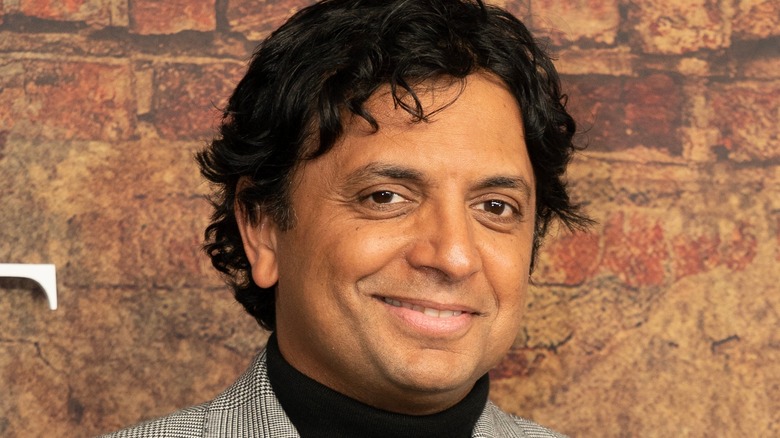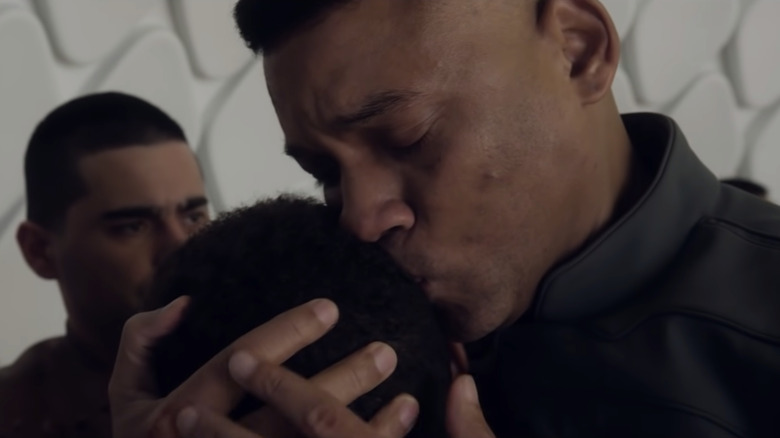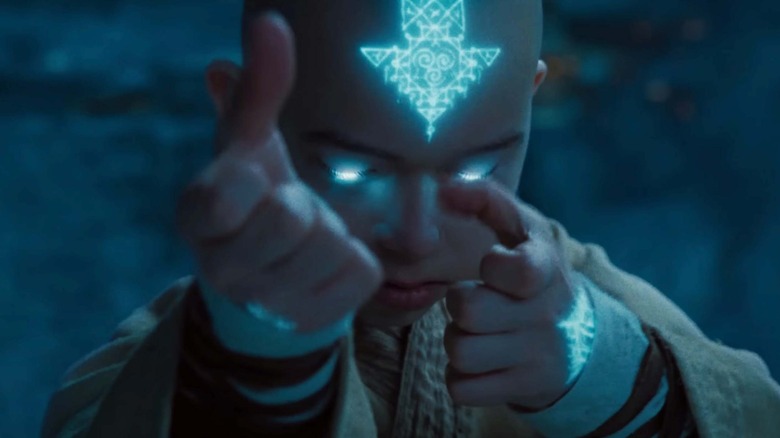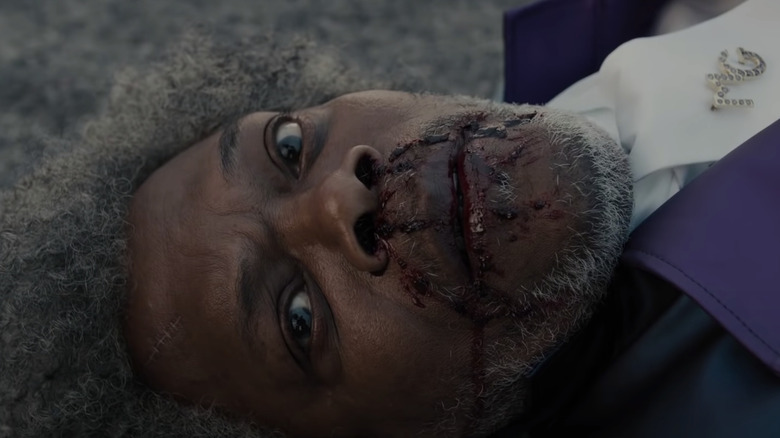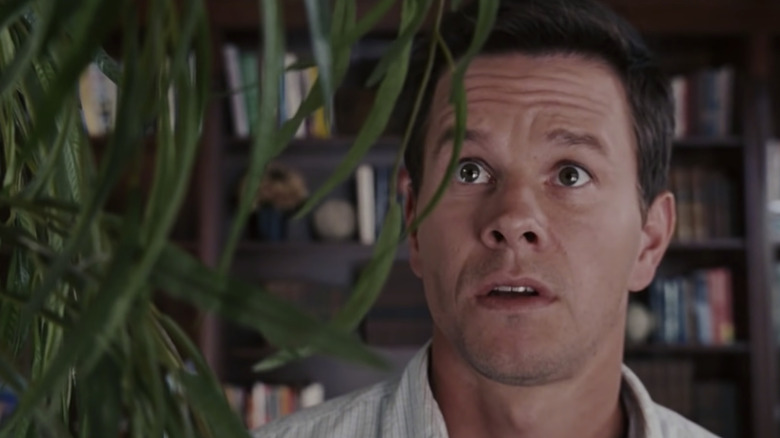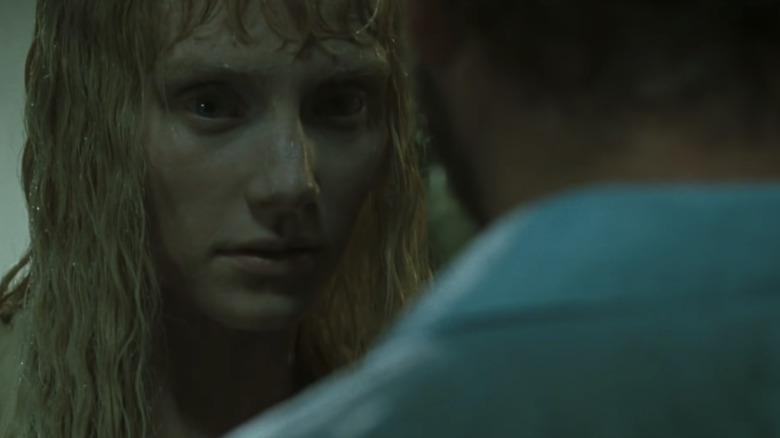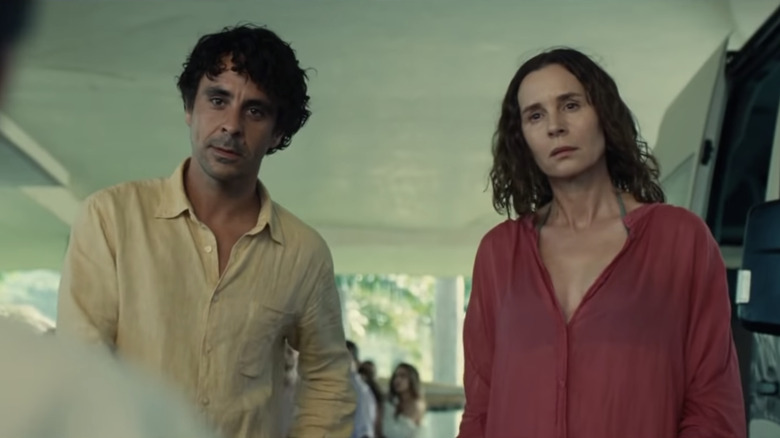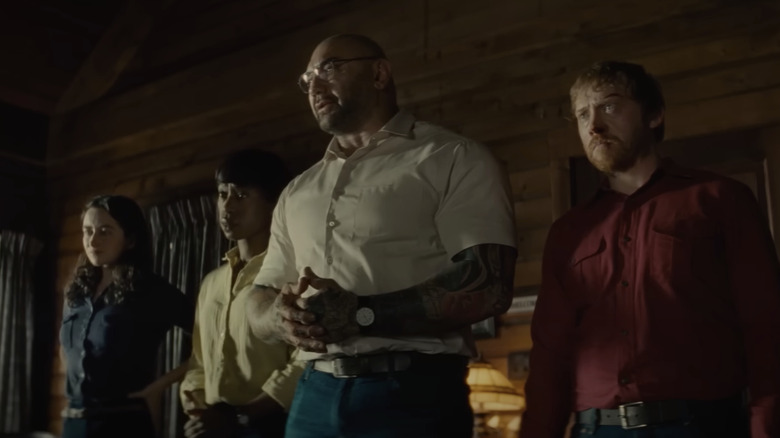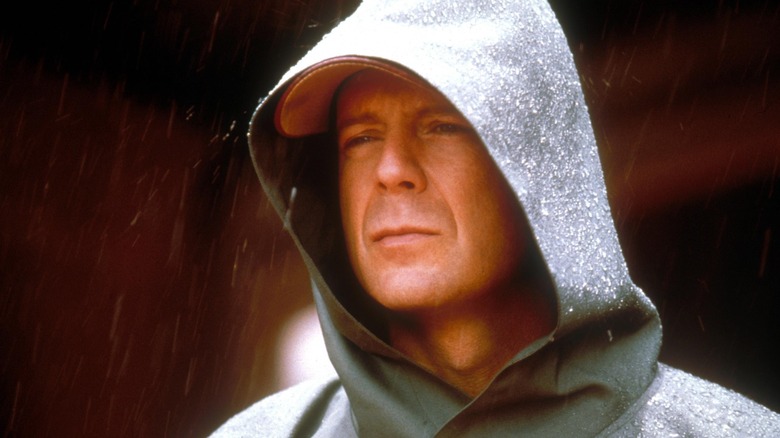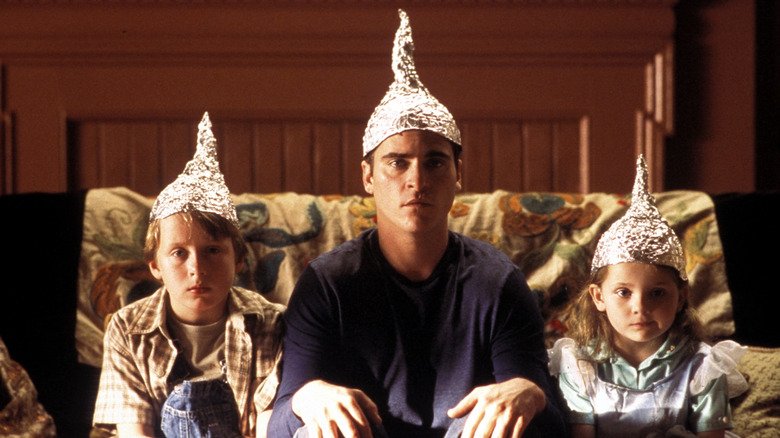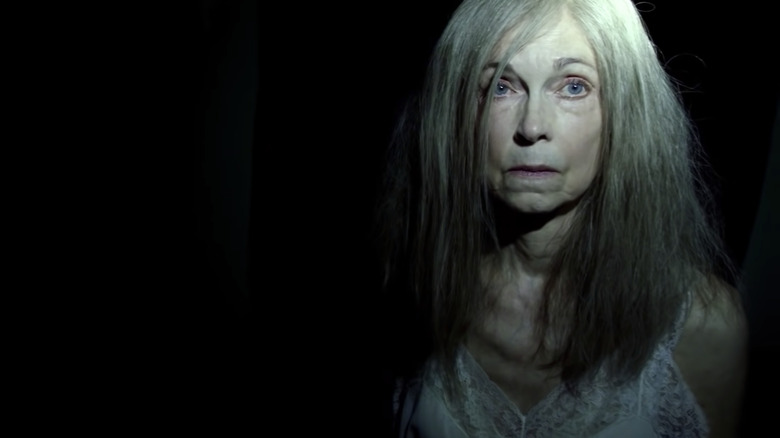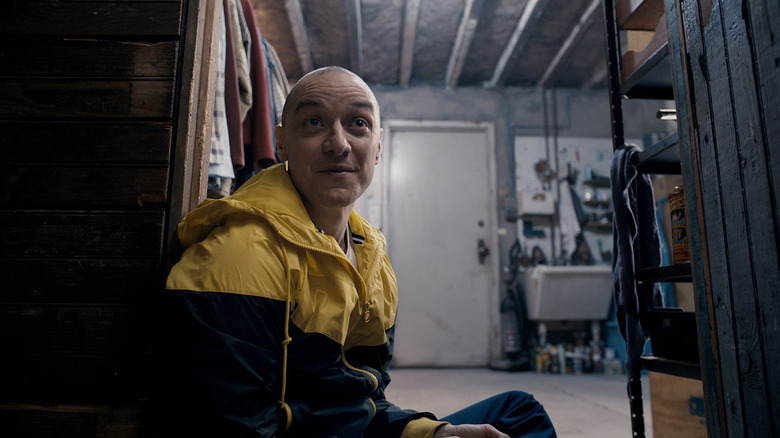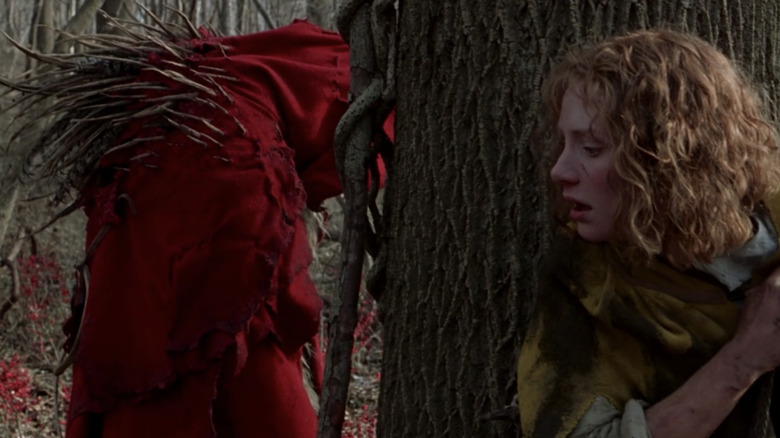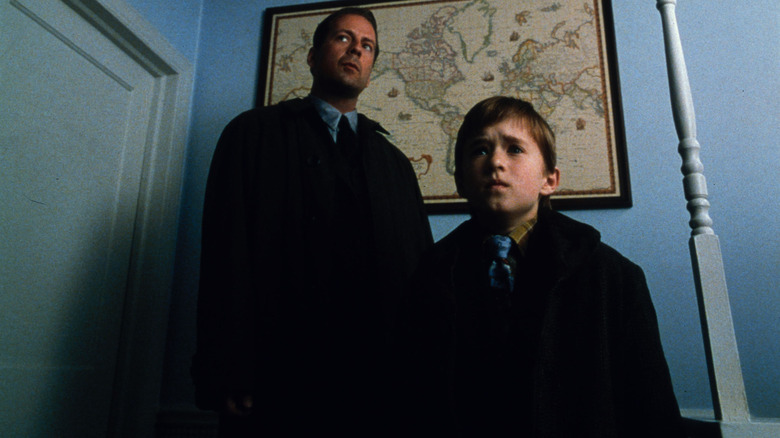M. Night Shyamalan Movies Ranked By Their Twists
Sometime after directing his first two feature films and writing the original "Stuart Little" movie, and long before his work in television as a producer/director on Fox's "Wayward Pines" and the Apple TV+ series "Servant," M. Night Shyamalan made a name for himself via trademark, twisty endings. 1999's "The Sixth Sense" landed with an ending that still ranks among the greatest of all time, and after that success Shyamalan continued to lean hard into his "Twilight Zone"-esque twist — and becoming a pop culture icon in the process.
From "Signs" to "The Village," the "Unbreakable" trilogy, "The Visit," "Knock at the Cabin" and other films, not every twist has worked. But they typically re-contextualize the entirety of the film, pull a rug out from under the protagonist(s), and attempt to send the audience out of the theater buzzing.
Counting every feature film that Shyamalan has directed since 1999 — sorry "Devil" fans, he wasn't in the chair for that one — below is a (spoiler-heavy) look back at every ending, ranked by how exciting their twists really were. Whether you love Shyamalan's trademark twists or hate them, they're vital to Shyamalan's distinct style — and largely coincide with whether the film was ultimately considered worthwhile.
13. After Earth (2013)
The big twist of 2013's "After Earth" is that, unlike most of Shyamalan's features at this point, there was no twist. This meta moment had audiences a bit confused, and the film was a huge miss with audiences and critics alike. What started out initially as the launching point for a franchise — with a father/son sci-fi story conjured up originally by Will Smith — quickly turned into a disaster that both Shyamalan and Smith regretted embarking on in the first place.
"What hasn't worked in my favor over the years are expectation and context," Shyamalan explained to The Irish Times when talking about the film. "On the expectation problem – you hear my name as an adjective – it means 'scary with twist ending'. I'm that guy. But I hardly ever make that movie. So that's always going to be an expectation that's not going to be met." While "After Earth" had a few more problems than the lack of a twist (namely Jaden Smith's lack of charisma), those Shyamalan-sized expectations certainly didn't help.
The thing about "After Earth" is that it's a story, and even a world, worth exploring. With themes that tackle the nature of the father-son dynamic in a post-apocalyptic world, Shyamalan's first distinctly science-fiction tale had a lot going for it upfront. Sadly, the film's poor execution didn't do it any favors, making "After Earth" Shyamalan's final time (to date) that he didn't embrace the twist.
12. The Last Airbender (2010)
Largely considered the worst film in Shyamalan's catalog, "The Last Airbender" was a movie that plenty were excited for upon its announcement, but left the theaters wishing it had never been made. The first film of a proposed trilogy, "The Last Airbender" dashed any hopes of continuing the story after the visceral negative responses from fans and critics alike, not to mention the disappointing box office numbers. That's what happens when you ignore the source material.
Of course, Shyamalan's twist here is that "The Last Airbender" is almost nothing like the Nickelodeon show on which it is based, right down to the mispronunciation of the titular character's name. This should've been easy to see coming, however, as even the title of the film, "The Last Airbender," failed to capture the full scope of the original series. Yes, the "Avatar" part was dropped because of a certain James Cameron film, but at least the CGI in Cameron's looked good.
In a 2010 interview with Vulture, Shyamalan was confronted by the plethora of negative reviews aimed at "The Last Airbender." "I don't know what to say to that stuff," he said in response. Years later, Shyamalan reflected further on his time directing the failed "Avatar" adaptation. "I did these movies, and I rightfully got crushed, because they rightfully said, 'You don't believe in yourself, you don't believe in your own voice, and you don't believe in your values."
11. Glass (2019)
Serving as a finale to the long-gestating "Unbreakable" trilogy (alternately referred to as the "Eastrail 177 Trilogy"), "Glass" was meant to reunite Bruce Willis' David Dunn (aka the Overseer) with Samuel L. Jackson's Elijah Price (aka Mr. Glass). As a film almost 20 years in the making, expectations were understandably pretty high, with Shyamalan and producer Jason Blum both referring to it as the former's distinct take on a superhero film (via Digital Spy). Needless to say, nobody saw the twist near the end of the third act coming. In fact, some wish it hadn't come at all.
In the final hour, the Overseer battles against "the Beast" — the superpowered personality of Kevin Wendell Crumb (James McAvoy from "Split") — and nearly dies in the battle as the supervillain exploits his weakness: water. Thankfully, David overcomes, but all is for nothing when a SWAT team arrives, killing both David and Kevin under orders from Dr. Ellie Staple (Sarah Paulson), whose organization hopes to keep the existence of superhumans secret. But, as he always does, Mr. Glass had an alternate plan, leaking footage of the battle, including David and Kevin's executions, to the public.
Though watching Glass one-up Staple was pretty neat, the death of David Dunn in particular was, well, underwhelming. For everything David had fought for, and for all his heroics, he was murdered in weak fashion. While that admittedly might've been the point, it proved to be a silly one, garnering disappointment.
10. The Happening (2008)
"The Happening" isn't the most loved Shyamalan film out there, with a 17% on Rotten Tomatoes, and even a leading man who admits it's a "a bad movie."
The thriller starred Mark Wahlberg and Zooey Deschanel as Elliot and Alma Moore, a couple who join a group of survivors in their quest to escape a contagious bout of mass suicides. Revealed to be caused by plant life around the Boston and Philadelphia areas, the sudden and terrifying events are met with fear, paranoia, and plenty of strange behavior.
While there are a few twists along the way — including Wahlberg bearing his soul to a potted plant in order to escape death, only to learn that it's plastic, seriously — the biggest might be that, by the time Elliot and Alma are finally ready to give in and step outside, the pandemic ends. The plants are no longer killing, allowing the stars to continue their lives with their newly adopted daughter. The film ends in Paris, with the same events happening again just outside the Luxembourg Gardens, meaning the plant attacks decided to hop the pond.
When speaking with Daily News, Shyamalan said that "The Happening" was his attempt at "making an excellent B movie"; for all it's faults, "The Happening" is best when recontextualized in that light, a B-flick full of A-list stars and production value. Maybe the real twist was that Shyamalan knew it wasn't his A-game from the jump.
9. Lady in the Water (2006)
Originally conceived as a bedtime story for Shyamalan's children, "Lady in the Water" is a modern fairytale that centers on a man named Cleveland Heep (Paul Giamatti) after he encounters a water nymph (called a Narf here) named Story (Bryce Dallas Howard) in the pool at the center of his housing complex. It's a strange tale, and Shyamalan's first departure from the traditional twisty-thriller format that put him on the Hollywood map.
The twist here comes before the end of the movie. After Story is injured, she tells Heep that she'll need the help of a Guardian, a Symbolist, a Guide, and a Healer to return to her fairytale home. Aided by a local movie critic (Bob Balaban), Heep finds folks from their complex who fit the traditional tropes associated with those roles, but they turn out to be wrong — which nearly costs them their lives. Thankfully, Heep eventually uncovers Story's true protectors and helps her get home safely by the film's end.
Despite mixed reviews, "Lady in the Water" is an intriguing flick that played with some compelling concepts (namely, the subversion of traditional movie tropes) and to this day Shyamalan will defend it. Sadly, this began the critically-panned era of Shyamalan's filmography, though "Lady in the Water" could be considered the best of his films from 2006-2013. A decade later, Shyamalan returned to the twisty thriller, leaving this strange divot in his greater body of work behind.
8. Old (2021)
Of all the twists in Shyamalan's filmography, the one in "Old" might be the most disturbing. Although viewers don't learn how the beach accelerates aging, the dastardly forces behind the entire traumatic ordeal are uncovered. As it turns out, a pharmaceutical company named Warren & Warren is the culprit behind some advanced, highly-unorthodox drug trials. Because of the aging properties of the secluded beach, the company is able to test the life-long effects of various concoctions within a few hours.
In a second twist, a now-middle-aged Trent (Emun Elliott) and Maddox (Embeth Davidtz) — the only survivors of trial 73 — spill the beans on Warren & Warren's corrupt procedures. By the time "Old" ends, it's implied that the pharmaceutical company is now under heavy investigation, and those in charge will be arrested. Of course, that doesn't answer every question, like the origins of the enchanted nature of the beach or how Warren & Warren have gotten away with this for so long, but it does brings some closure to this dark family tragedy.
Loosely based on the Swiss graphic novel "Sandcastle," Shyamalan's 2021 horror-thriller did solid box-office (via Box Office Mojo). As a part of the Universal era of the filmmaker's career, "Old" thrived because it highlights the strange relationship people have with time, and how quickly it creeps up. "Coming out of COVID it feels like time just stopped," actor Alex Wolff explained to Entertainment Weekly, "And that's what the movie's literally about."
7. Knock at the Cabin (2023)
"Knock at the Cabin" revisits some of the almost biblical themes from the filmmaker's earlier feature, "Signs," just with a completely different angle. No, these two aren't connected by anything other than apocalyptic contexts, but that doesn't make this flick any less intense. In fact, "Knock at the Cabin" is arguably the most anxiety-inducing films in Shyamalan's catalog, largely because of the implications of having to sacrifice an innocent life for the sake of the world.
Adapted from the novel "The Cabin at the End of the World" by Paul G. Tremblay, Shyamalan's ending is a bit different from the original horror story. The twist here is that the apocalypse was real the entire time, and rather than Leonard (Dave Bautista) and his companions representing homophobia, they're actual stand-ins for the biblical Four Horsemen of the Apocalypse. Because of this, Eric (Jonathan Groff) chooses to sacrifice himself to stop the apocalypse, which shockingly ceases on cue.
Receiving mostly positive ratings from critics and audiences, "Knock at the Cabin" proved again that Shyamalan still has what it takes. The twisty-thriller might echo "The Cabin in the Woods" by the end, but given its turn towards the greater good rather than individual freedoms, it remains unique enough to stand on its own.
6. Unbreakable (2000)
As Shyamalan's first venture into the comic book/superhero space, "Unbreakable" packed a mean punch, highlighting the talents of those in front of and behind the camera.
Bruce Willis shines as David Dunn, who uncovers his abilities as a superhero through is impervious nature. Aided by the mysterious Elijah Price, a comic book collector played to perfection by Samuel L. Jackson, David discovers the truth behind his origins.
The beginning of the film starts with the crash of the Eastrail 177 train, of which David is the only survivor. By the film's end, the big twist reveals that Price was the villain behind the crash rather than the hero's benevolent mentor — adopting the moniker Mr. Glass due to the easily breakable nature of his bones. It's a powerful moment that challenges David's superhuman instincts and reminds the viewer what it means to be a hero.
Although it's not the film he's most well-known for, one could argue that "Unbreakable" is the biggest success in Shyamalan's career since it spawned an eventual trilogy. The film eventually let him tell the origin stories (and falls) of two distinct superhumans in a unique take on the superhero genre.
5. Signs (2002)
An original apocalyptic feature that blends rural Pennsylvanian farmland with an alien invasion, "Signs" is ultimately a story about faith. Centering on the family of the former Reverend Graham Hess (Mel Gibson), the film showcases their dysfunction and the patriarch's loss of faith after the death of his wife. As mysterious crop circles appear and aliens begin their crusade, the Hess family hunkers down to wait out the apocalypse. This is when viewers learn of the alien's aversion to water.
If you think the main twist here is that the aliens can be killed by water, you weren't paying enough attention. The actual twist of "Signs" is that the wife's ramblings just before her death were not just a collection of old memories, but a prophecy. Everything she says comes to pass in the final battle against the alien invaders taking place inside the Hess home, including Merrill (Joaquin Phoenix) using his minor league baseball experience to beat up the creature.
The most powerful moment of "Signs," however, might be when Hess holds his young son (Rory Culkin) in his arms as he recognizes that the boy's asthma is what closed his lungs, keeping him safe from the poison. The themes of divine providence and God's sovereignty are all over this one, which inspires Hess to pick his clerical collar back up before the credits roll. It's a great twist, done to perfection by Shyamalan.
4. The Visit (2015)
His first attempt at found-footage horror, Shyamalan followed a long dry spell by restoring his reputation as a thriller filmmaker and the master of the twist with "The Visit."
Following teenagers Becca (Olivia DeJonge) and Tyler (Ed Oxenbould) as they spend a week with their "Nana" (Deanna Dunagan) and "Pop Pop" (Peter McRobbie), whom they've never met, they soon discover that not everything is as it seems. As their grandparents get stranger, Becca and Tyler become even more determined to discover the truth.
In the end, it is revealed that Nana and Pop Pop aren't their grandparents at all, but rather escaped mental patients who killed their real grandparents and stole their identities. Tyler and Becca are forced to violently overpower the elders to escape, and from there they kill their faux-grandparents before being reunited with their mother (Kathryn Hahn). The whole affair is pretty gruesome, as Shyamalan relies heavily on horror, but it proved to be a success, taking in over $98 million worldwide.
This flick successfully relaunched Shyamalan's career, a relief to the filmmaker since he had personally financed the project with a $5 million loan against his own home. It landed Shyamalan a long-term partnership with Blumhouse Productions as well as Universal Pictures, who distributed his next four films.
3. Split (2016)
The second installment in Shyamalan's trilogy, "Split" wowed audiences with James McAvoy's performance as the disturbed Kevin Wendell Crumb, a criminal with dissociative identity disorder (DID) and 23 distinct personalities casually referred to as "the Horde." There are a few twists in this one, the number of personalities within Kevin being one of them, but another surprise was the moment Casey (Anya Taylor-Joy) was revealed to be a victim of abuse just like Kevin, causing his murderous personality "the Beast" to deem her "pure" and spare her life.
In fact, it's this personality that leads to the biggest twist of all. As it turns out, "the Beast" is superhuman, unable to be hurt by shotgun blasts due to its superior strength, which also allows it to climb on walls. With this revelation, the final moments of "Split" include a familiar musical cue by James Newton Howard as Bruce Willis' David Dunn appears, officially connecting "Split" to Shyamalan's superhero epic "Unbreakable." As it happens, Kevin's father was killed on the same train that David survived back in 2000, leading to Kevin's abuse at his mother's hand.
Establishing "Split" as the second installment of what would become the "Eastrail 177 Trilogy" — and the first sequel Shyamalan ever made — changed the entire trajectory of the film, prepping audiences for what would become "Glass." Interestingly, "Split" relied on thrills and horror to built up the anticipation, which worked out in the end, propelling the Shyamalan franchise forward with force.
2. The Village (2004)
Branded as a period thriller, "The Village" was an intense drama that threw everything you thought you knew about the world of the film out by the end.
As if one big twist wasn't enough, there are multiple game-changing turns here. After the blind Ivy Elizabeth Walker (Bryce Dallas Howard) and the reluctant Lucius Hunt (Joaquin Phoenix) decide to marry, Lucious is mortally wounded by Noah Percy (Adrien Brody), a rival for Ivy's affections, forcing Ivy to travel beyond the village for medicine.
Within the forest, "Those We Don't Speak Of," a group of red-clad demons, patrol the woods to keep the villagers within their homeland. Or, so the audience is led to believe. It turns out that the demons aren't real at all, but creations of the town's elders to keep folks from what's actually out there: The modern world. It's revealed that generations ago, a group of grieving parents and widows decided to make a place free from the cares of the world, a village hidden deep within a walled wildlife preserve.
Unfortunately, Ivy doesn't learn all of this, and while she does succeed at finding medicine on the other side, she returns to the village blissfully unaware of the world out there. She does, however, encounter another forest demon, tragically reigniting her belief they're actually real (it's revealed to be Percy in disguise, who dies chasing her). Of all Shyamalan's crazy twists, "The Village" may be the filmmaker at both his strangest and his most adept.
1. The Sixth Sense (1999)
To say that "The Sixth Sense" changed cinema might be overstating its importance a bit, but there's little doubt that this was a twist that audiences never saw coming. Shyamalan's first venture into the twisty-thriller became the talk of moviegoers everywhere, and at a time before internet spoilers were a thing, it was one of cinema's last great secrets, challenging everything those who had just seen the film thought they knew.
Yes, Haley Joel Osment's Cole sees dead people, but the ghost he helps the most isn't the one who was wrongfully poisoned, it was Malcolm Crowe (played by Bruce Willis) all along. In his first thriller, Shyamalan smartly shot "The Sixth Sense" as to not give this twist away, and looking back on the film knowing Malcolm's fate, it's truly remarkable how well he hid the ending, and how easily audiences bought it. Even those who would argue against it being the single greatest of Shyamalan's twists would have a tough time debating that it's the most impressive.
It's no wonder that this film was praised by audiences and critics alike, establishing Shyamalan's role as a modern day Hitchcockian "master of the twist." While it may have put the filmmaker in a box, the distinction also helped him land acclaim, power, and the attention of top talent for the next several decades. Will Shyamalan will ever top the impact of "The Sixth Sense"? If so, that could be the greatest career twist of all.
